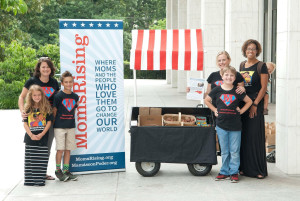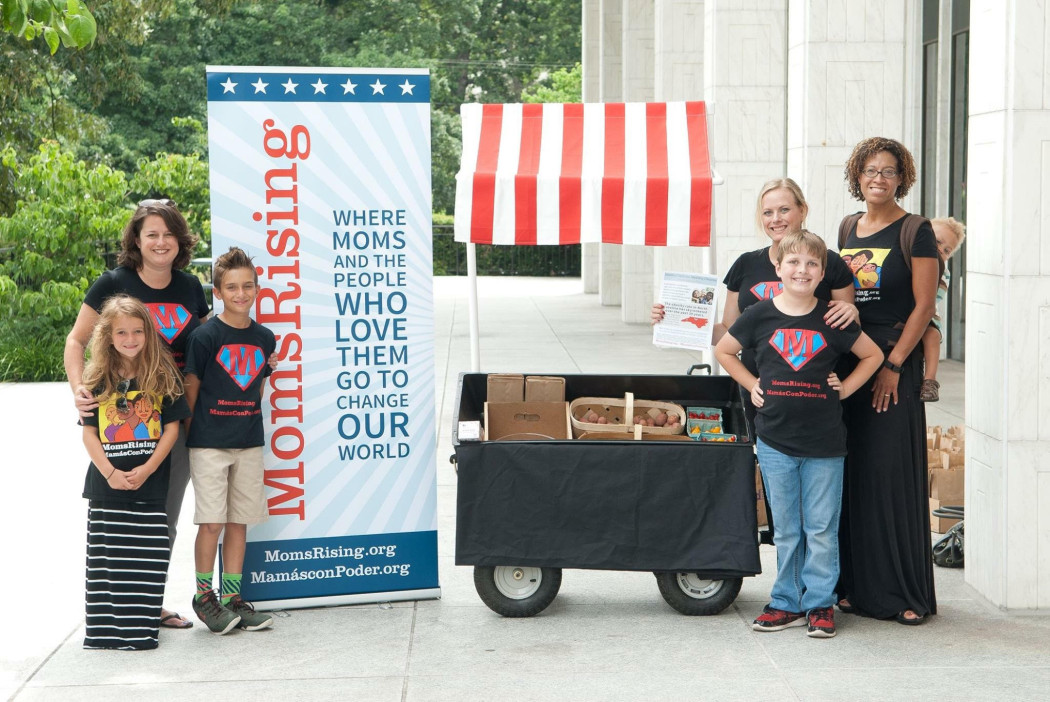>>
By Beth Messersmith, MomsRising
I’m a self-described, unapologetic voting fangirl. I look forward to Election Day like others look forward to Halloween. One of my favorite parts of being a mom is taking my children to vote with me and teaching them that their voices – and someday their votes – matter.
But I must admit that this election season has been much harder as a parent. Where I usually make an effort to have my kids watch the debates with me, this year I’ve struggled to shield them from what can only be called bullying behavior. Words matter. It’s a lesson I work hard to teach my kids.
When a candidate for president says he wants to hit someone, calls a breastfeeding mom “disgusting”, or characterizes an entire group of people as rapists, our kids are listening. When a leading part of a campaign platform is building walls and banning people from entering our country, our kids are listening. And when a mother and her child are mocked and thrown out of a campaign gathering and then publicly shamed afterwards, our kids notice.
I tell my children on a regular basis that the goal of politics and public policy is supposed to be bringing people together to solve problems and figure out how to go further together. Since my oldest was a toddler, I’ve been taking my kids with me to the NC General Assembly and even to Congress. They’ve been on my hip as I spoke at press conferences and in my lap as I testified for paid leave. They’ve sat in on numerous meetings with lawmakers and even shared their own concerns.
But what I fear they are taking from this election cycle is that appealing to people’s darkest fears is an appropriate way to win. That name-calling and bullying is an acceptable part of politics. That the voices of mothers and our children should be silenced and removed instead of welcomed.
We’re already seeing the fallout. Where presidential elections are usually opportunities to teach about the electoral process, citizenship, and democracy, an online survey conducted by Teaching Tolerance found that this year’s campaign is already having a serious negative effect on children and classrooms.
The >>Southern Poverty Law Center released a report earlier this year noting that the campaign is producing “an alarming level of fear and anxiety among children of color and inflaming racial and ethnic tensions in the classroom.” Latino students say they worry about being deported while Muslim students fear being banned. Other kids are being emboldened by the coded–and overt–racism and sexism in the campaign. As a result, teachers report seeing an increase in bullying, harassment, and intimidation of students whose communities have been the targets of negative campaign messages.
One of my greatest fears is that the outcome of this election cycle will be future voters who think this is what politics is all about and for whom that translates into diminished faith that electoral politics works and is worth their time.
So, what can we as parents do? Learning about the responsibilities of citizenship isn’t something that happens overnight. Talking with your kids about your values and how they guide your vote is key. Taking them with you to vote, not just during this election but every election, has been shown to significantly impact whether they’ll grow up to be voters themselves.
Making voting a family tradition can make it fun and memorable. This fall MomsRising will be rolling out a toolkit with all you need to plan your own family voting party. Sign up at >>MomsRising.org to get a copy as soon as it’s released. >>Kids Voting Durham also has lots of resources that can help, including recommendations for books about voting, craft activities, and other ways you can engage your children in the process.
We need as many moms (and the people who love them) voting this year as possible. Pledge to vote by texting VOTE to 747-464, and you’ll get updates on polling places, voting laws, and other voting info you can use from MomsRising’s #MomsVote team.
But the unique challenges of this election year mean we can’t stop at voting. We must equip our children with tools to prevent bullying and harassment, address bias, and value diversity. >>Teaching Tolerance has tools to help start that conversation, and >>Standing Up for Racial Justice (SURJ) has put together a toolkit to help parents talk about race and bias with their children.
Creating spaces to discuss what your kids hear about candidates on the playground or in the media is also critical. Asking them what they think about what they’re hearing and any concerns it raises for them helps create thinkers who can question and form their own opinions. The Southern Poverty Law Center reminds parents and educators of the importance of talking about the role of free speech and a free press while also lifting up the fact that majority rule can never undercut minority rights.
Above all, I try to teach my kids that –as important as the election is–it’s not the end game. It’s up to us hold elected leaders accountable by getting to know who represents us at every level, sending letters and making calls, and showing up at hearings or rallies when you can. Making civic engagement part of your life as a family will pay off both for your kids and our community. If you need help getting started, email me at Beth@momsrising.org , and I’ll be glad to get you plugged in.

There are no comments
Add yours